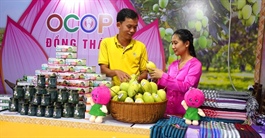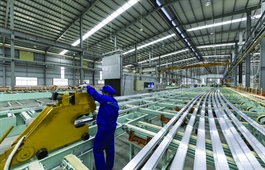Animal husbandry must go high-tech for export expansion
Animal husbandry must go high-tech for export expansion
Animal husbandry in Viet Nam must apply high-tech solutions to meet the quality requirements of foreign markets to expand exports, experts have said.

Although seeing significant developments in recent years as the industry has seen big companies step in, animal husbandry still failed to increase the export of meat products.
The export of processed meat remains modest compared to the scale of the husbandry industry.
Ministry of Agriculture and Rural Development statistics showed that the export of husbandry products was estimated at US$139 million in the first five months of this year, dropping by 16.2 per cent against the same period last year.
The country imported husbandry products worth $1.2 billion from January to May, meaning a trade deficit of nearly $1.2 billion in the period.
According to Nguyen Thanh Son, President of the Viet Nam Poultry Association, Singapore recently faced a shortage of chicken because Malaysia, which held a market share of 34 per cent in Singapore, banned the export of chicken from the end of May to ensure domestic consumption.
Son said that this provided an opportunity for other countries to export chicken to Singapore, but it was not easy for Viet Nam to grab that opportunity.
Son pointed out that Singapore had very strict standards for imports. In addition, chicken prices in Viet Nam were higher than in Brazil and the US, exporting chicken to Singapore with a market share of 49 per cent and 12 per cent, respectively.
Viet Nam had been negotiating with Singapore to export chicken for years but had not yet successfully opened the door to this market, Son said.
To date, Viet Nam managed to export processed chicken to Japan (from 2017), Hong Kong (from 2019) and the Eurasian Economic Union (from 2021). In 2021, Viet Nam exported 2,531 tonnes of processed chicken, mainly to Japan and Hong Kong.
Viet Nam's animal husbandry generally does not have many competitive advantages due to high prices, Son said, adding that the industry must rely on imports for raw materials of animal feed and high-productivity chicken, pig and cow breeds.
According to the agriculture ministry, the country's pig and poultry count developed stably in recent months as diseases did not occur on a large scale, but animal husbandry was hit by rising feed prices.
The ministry said that high feed prices were eroding the competitiveness of meat products.
Son said animal husbandry should focus on serving the domestic market first and gradually expand exports when competitiveness was improved, quality increased, and production costs reduced.
There would be enough supply of pork and chicken for the domestic market this year, Son forecast.
Go hi-tech
Bui Chi Buu, former Director of the Southern Institute of Agricultural Science and Technology, said that the husbandry-based household economy had declined significantly and no longer played the leading role.
Instead, the high-tech husbandry of businesses was developing strongly, leading to increases in the number of livestock and poultry, Buu said, adding that this was a good signal for the husbandry industry to grow sustainably and expand exports.
According to Bui Huu Doan from the Viet Nam National University of Agriculture, high-tech husbandry was a closed chain from the breed quality to a modern slaughter system.
However, it was not easy to promote the application of technologies in the husbandry industry because production remained small-scale and scattered.
Deputy Minister of Agriculture and Rural Development Phung Duc Tien expects that the Viet Nam's animal husbandry will see a bold change in the next few years as many enterprises invested in high-tech farming and processing, including CP Viet Nam and Masan.
Recently Hung Nhon Group and De Heus (Holland) started the construction of a DHN high-tech agricultural complex in Gia Lai Province with a total investment of more than VND1 trillion (over $43 million) to build a closed pig raising and processing chain, which applied Industry 4.0 technologies to control quality, increase productivity and lower costs.
The International Finance Corporation recently signed an agreement to invest $52 million in common equity in Mavin Group Joint Stock Company to support the expansion of Mavin's genetic pig breeding stock and breeding farms in Viet Nam.
Can Tho Techno – Agricultural Supplying Joint Stock Company, has joined with Dabaco Viet Nam to develop a herd of 1 million pigs by 2028 in southern provinces.
With the wave of investing in high-tech farming, the industry shifted from small-scale household farming to professional breeding and large-scale farming.
Typically, there were only about 2 million breeding establishments in pig raising across the country, with an average decreasing rate of 5-7 per cent per year.
In 2019-21, the number of household-scale pig farms dropped by around 20 per cent, while 16 large enterprises had 5.8 million heads, accounting for 20.7 per cent of the country's total herd.
According to Tien, with a strong investment in businesses, Viet Nam's animal husbandry industry is expected to move towards industrialisation and modernisation.


















